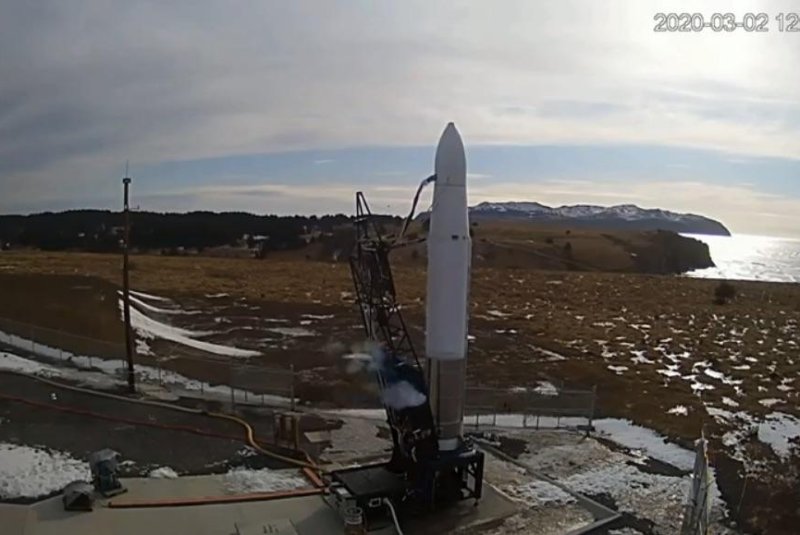Astra's rocket stands Monday on a launch pad at Kodiak Island, Alaska. Photo courtesy of DARPA
March 2 (UPI) -- California-based space company Astra ended an attempt to launch a rocket Monday from Alaska, ending the government-sponsored DARPA Launch Challenge with no prize winner, according to the agency's chief of communications.
The challenge was designed to develop a capability for the U.S. military to send small satellites into space quickly -- speeding up the turnaround time from design and conception to launch day.
But the remaining finalist in the contest, Astra, was plagued by bad weather for days at the pad on Kodiak Island.
The cancellation means Astra won't get any of the $12 million it was hoping for, according to DARPA communications chief Jared Adams. DARPA stands for the U.S. Department of Defense Advanced Research Projects Agency.
If Astra still plans to launch the rocket, it will need new permits on a strictly private basis, Adams said.
Chris Kemp, Astra's founder and CEO, indicated the company would move ahead with launch plans for the rocket.
"We decided it would be better to scrub the launch and try to get another day. Winning the challenge would have been fantastic today, but our objective really is to reach orbit in as few flights as possible," Kemp said.
Adams said DARPA considers the challenge a success because Astra reached launch day with efficient, lean launch technology, which still can be used and developed. Similar DARPA challenges have ended with no prize money, but helped to develop technology, he said.
"The goals we set forth for the Launch Challenge are incredibly hard. The preferred outcome was to see Astra accomplish two successful launches from two different locations within a short period of time," Adams said.
The launch had been delayed for days first because of blizzard conditions and then high winds at Pacific Spaceport Complex-Alaska.
On Monday, the launch had been set for 3:30 p.m. EST, but launch personnel first held the liftoff for about 25 minutes to avoid a possible collision with an "object in orbit" that turned out to be the International Space Station.
Then, just seconds before liftoff, a hold was called by the guidance, navigation and control officer, citing only "off-nominal data." The company announced the cancellation just before 6 p.m.
The launch was to be the first of two planned, with a $2 million prize. If successful, Astra would advance to a second launch attempt with a prize of $10 million.
"We're trying to make rockets a lot more like people build cars," Astra co-founder Adam London said. "We are excited to show ... what we think to be a very responsive, very portable launch infrastructure."
As a startup, Astra had previously conducted two launch tests with rockets that didn't reach orbit. One of those ended abruptly, but the company didn't release information about it.
Astra had only weeks to prepare after getting the challenge details. That included what kind of small satellites, or CubeSats, would be launched, and what type of facilities would be provided and the intended orbit, DARPA officials said.
Astra's rocket is relatively small at just over 38 feet compared to SpaceX's Falcon 9, which is more than 229 feet high. The Electron rocket used by another small launch company, Rocket Lab, is 56 feet high.
Astra, based in Alameda, Calif., says it can carry up to 330 pounds into low orbit. For the challenge launch, it was supposed to carry three CubeSats and one space beacon weighing a few pounds each.
Two of the CubeSats were designed by the University of South Florida for its ARCE-1 mission, designed to demonstrate how small satellites can communicate with each other to facilitate tracking and managing large satellite constellations.
According to DARPA, the payload had included a Department of Defense Prometheus CubeSat to improve the responsiveness of relaying military tactical data.
The challenge drew more than 50 initial entrants. Astra was the only one remaining.
Part of the challenge was to demonstrate the ability to launch from another pad quickly, within weeks.
Astra includes former NASA and SpaceX executives, led by Chris Kemp, a former NASA chief technology officer.















